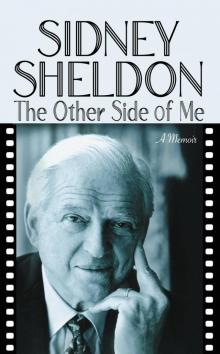- Home
- Sidney Sheldon
The Phoenix Page 2
The Phoenix Read online
Page 2
Peter had to admit that he was, blissfully happy. The bullies were gone, he was playing his beloved music twenty-four hours a day, and he got to come home to his best friend, the most magical, gregarious, and most alive person he knew. Giving up sex with men seemed like a small price to pay.
He was even happier when, a few months later, Athena fell pregnant with their first child, a boy.
‘We’ll call him Apollo,’ she gushed, ‘after the god of music and beauty.’
And beautiful he had been, so impossibly beautiful, for the twenty short minutes of his life.
CHD the doctors said. Congenital Heart Disease. ‘He didn’t suffer,’ they told Athena. ‘Not at all.’
But three hearts broke that day, and Athena suffered enough for all of them. Later, Peter came to realize that the girl he had known all his life had died along with their son. That the Athena who came after was not the same as the one who had been before. Weeks of mute shock gave way to months of deep depression. Desperate to help, Peter tried everything: dragging Athena out to dinner and the park, taking her to doctors and therapists and hypnotists. He still remembered how delighted he was when Athena looked up at him one night, after another silent, miserable supper, and suggested that she take a trip back home to Greece.
‘There’s a place on Mykonos, my mother told me about it. It’s in a tiny village, between Kalafatis and Elia. They do “rest cures” and programs to help people through grief. It’s not cheap …’
‘It doesn’t matter,’ Peter assured her. ‘Go. You must go. I’ll find the money, don’t worry about that.’
It was the first proactive thought Athena had had since Apollo’s death, and Peter grabbed at it with both hands like a drowning man. He couldn’t have known that that would be it. The end.
It was on that trip to Mykonos that Athena met Spyros Petridis. Or rather, it was there, at her lowest ebb, that she fell under his evil spell. She wrote to Peter twice, strange, formal letters that sounded nothing like her, explaining that she had met someone and fallen in love and that she wasn’t coming back. Peter was gay and she needed more than a platonic relationship. The marriage would never have survived long-term.
Only in the very last line she wrote did Peter hear what sounded like Athena’s true, authentic voice. ‘Every time I see your face, I see his,’ she wrote. ‘It’s more pain than I can bear.’
And so he’d let her go. That was thirty years ago now, and Peter Hambrecht had had other, great loves in his life, not to mention a wildly successful career. But he’d never forgotten Athena. Over the years, as her fame, and her husband’s infamy, grew, Peter had watched Athena on television like a child watching a cartoon character. Or rather, characters, plural. The gracious socialite and hostess. The saintly goodwill ambassador. The untouchable beauty, People magazine’s ‘sexiest woman alive’. None of these was the real Athena.
Rumors swirled about Spyros Petridis’s criminal dealings, his murder squads and his drug gangs and his people-smugglers. But nothing was ever proven. Athena’s dazzling light, her aura of goodness, her magic, seemed to blind people to the dark underbelly of her husband’s world.
Peter suspected the rumors were true. But he never blamed Athena, not then, not now. However she might have changed, he knew his Athena could never, ever be responsible for the death or suffering of a child. Even if she were alive, there was no way on earth that she would be connected to what happened to that poor little Libyan boy. No way.
But she wasn’t alive.
She was dead, burned alive alongside her monstrous husband.
May God rest her soul.
East Hampton, NY
‘Goddamn it!’
Mark Redmayne shielded his eyes from the sun as he watched his golf ball veer wildly to the left of the eleventh hole before landing with an audible plop in the depths of the lake. He stiffened. Damn. A brilliant but ruthless businessman, Redmayne was in his early fifties, although he had the physique of a much younger man. Coupled with his stiff, soldier-like bearing, it helped preserve the aura of barely repressed violence that hung around him constantly, intimidating rivals and friends alike. Mark Redmayne was not a man one wanted to cross.
He was playing like an amateur today. Technically, of course, he was an amateur, but only because he didn’t have time to play golf professionally, not because he wasn’t good enough. Running a Fortune 500 company turned out to be a tiresomely full-time gig. And then of course there was Mark Redmayne’s other job. His duty. His calling. That was even more demanding. Especially on days like today.
He’d come to the golf course this afternoon to try to detach. It wasn’t working. His conversation of a few hours ago with Gabriel, one of The Group’s very best operatives, continued to haunt him.
‘It’s her, sir,’ Gabriel informed him bluntly over the telephone. ‘She’s alive and she wants us to know it.’
‘She’s not alive. She’s dead,’ Mark Redmayne said, as if by saying the words forcefully enough, he could make it so. ‘We killed her.’
Pinching the bridge of his nose to try to shut off the headache hammering wildly inside his skull, he gazed out of his office window. Below him, Manhattan lay spread out like a dream, a glorious kingdom he had conquered. Mark Redmayne hadn’t founded his company, but under his leadership he had grown it from the modest printing business his father had left him into a global multi-billion-dollar empire. It was incredible the effect a tragic childhood could have on one’s ambition, one’s determination to succeed at all costs. Business success, however, meant nothing to Mark Redmayne compared to this. The Group, and the work they did under Mark’s leadership – that was reality. That was what mattered.
‘We killed them both,’ he muttered, as much to himself as to his operative on the other end of the line.
‘Maybe not,’ said Gabriel.
‘“Maybe?” … Don’t you give me “maybe not”!’ Redmayne exploded. ‘I was there, OK? I watched that chopper go down.’
Most of The Group’s agents were terrified of the boss’s temper, and with good reason. Mark Redmayne wasn’t known for his compassion; his retribution, once invoked, was ruthless. But Gabriel was one of the few people immune to his outbursts. Nothing could sway him from the facts.
‘Athena Petridis’s DNA was never found, sir.’
A muscle on the side of Mark Redmayne’s jaw began to twitch.
‘Because her remains were destroyed in the fire.’
‘But her husband’s weren’t?’ Gabriel challenged. ‘They were in the cockpit together, side by side. If his bones didn’t burn, why should hers?’
‘I don’t know,’ Redmayne admitted grudgingly. ‘I just know that they did. This discussion is over.’
He hung up, which was childish, but he didn’t have the strength or the patience to listen to any more of the agent’s doubts. Largely because they were his doubts too. As soon as he saw the picture, the dead child with his branded foot, he knew. Athena Petridis, that bitch, that witch, that untouchable monster of a woman … was alive.
Mark Redmayne had hated the Petridises for a very long time. There was a special place in his psyche for people who hurt children. The terrible secret of his own childhood – the single, awful event that had made him who he was and led him to The Group in the first place – had fanned the flames of his loathing into a raging, crazed, homicidal inferno which no force on earth could ever put out.
But what if somehow – impossibly – Athena Petridis had survived the crash that had killed her husband? And she was out there right now, laughing at them, laughing at him, for having the audacity to think he’d won. For twelve years, she’d played dead, lulling The Group, and the world, into a false sense of security. But now, with this sick, cruel message, this violation of an innocent child – L – she was back.
‘I’ll fetch you new balls, sir.’ Mark Redmayne’s caddy looked nervously at his employer. Mr Redmayne was not used to losing, and had a reputation for taking his frustrations out on the closest unde
rling to hand. This time, however, to the caddy’s relief, he seemed oddly calm.
‘No need, Henry. There’s nothing wrong with my old balls. I just need to remember I have them.’
‘Sir?’
‘And then I need to start playing a bit better.’
Back in his Bombardier Challenger Learjet after the round, Mark Redmayne made the call he’d been putting off since this morning.
‘Let’s say you’re right.’
‘Sir.’ Gabriel waited.
‘Let’s say she’s alive.’
‘She is alive, sir.’
‘So you say. But what leads do you have?’
‘None yet, sir.’
‘Well find some if you expect me to take you seriously,’ Mark Redmayne commanded, and hung up.
Opening his briefcase, he looked again at the picture of the dead boy. No name. Just a tiny, maimed corpse, washed up on the beach like so much trash. That was how Spyros Petridis had treated the poor and the powerless. Like trash to be discarded. And his she-devil wife had helped him do it.
No governments had had the balls to take on the Petridises. It had been left up to them, to The Group, to do what needed to be done. To right what was wrong. To track down evil wherever it lurked, and destroy it whatever the cost. The Group operated outside of laws, outside of boundaries, outside of national interest or political or religious affiliation. They took risks no one else would take. And they covered their tracks. Always.
Killing Athena Petridis once had been Mark Redmayne’s duty.
Killing her twice would be his pleasure.
Sikinos, Greece
Sister Magdalena, Mother Superior of the tiny Convent of the Sacred Heart, bowed her gray head in prayer. Dusk had already fallen, and through the windows of the remote, Byzantine chapel set deep in the island’s wilderness, one could glimpse the setting sun bleeding its dying rays into the sea.
Forgive me my transgressions, the elderly nun murmured, her arthritic fingers worrying at the rosary beads around her neck. Help me to find the right path, Lord. Guide me through the darkness.
Most of the nuns were at supper in the refectory, a simple repast of tomatoes, olives and vine leaves stuffed with wild rice. But Sister Magdalena always fasted on this day: the anniversary of Sister Elena’s arrival.
Sister Elena and the visiting priest, Father Georgiou, were the only other souls in the chapel tonight. Across the stone-flagged nave, inside an exquisite, medieval carved wooden confessional, Sister Elena was receiving the sacrament.
‘Bless me, Father, for I have sinned.’
The Mother Superior could hear only mumbling: first Elena’s soft, singsong tones and then Father Georgiou’s deep baritone. Although of course she knew the words by heart.
‘Name your sins, my child.’
What sins could Elena possibly have? This kind, gentle, endlessly patient soul? This stoic, even cheerful, sufferer of torments that would have broken any ordinary human being? Poor Sister Elena. She had lost so much. Her youth, her beauty, her loved ones. Even now, all these years later, the doctors said she was in constant physical pain. And yet her faith remained as strong as ever, a shining beacon of hope through the dark night of despair.
She should be leading us, Sister Magdalena thought, for the thousandth time. Not me. I’m like John the Baptist, unfit even to wash her feet. And yet Sister Magdalena accepted that this was God’s plan. Elena had come to them on the boat from Ios like baby Moses in his basket of reeds, a helpless refugee. Although she had never spoken of what or whom exactly she was fleeing, no one doubted the sincerity of her plight. Back then she’d been too weak to lead the community. Now she was too humble, too devoted to her own spiritual life of purity and sacrifice.
Sister Elena emerged from the confessional. Seeing the Reverend Mother kneeling there, she bowed her head once respectfully, then hurried back to her cell to begin her penance. Could words and prayers and fasting really right the wrongs of the past? Or the present, for that matter? It was a nice idea. Evil and goodness existing like numbers on some sort of balance sheet that could be moved around at will. If only that were true.
In the privacy of her bare room she began removing her garments one by one and laying them neatly on her bed. The heavy wool tunic, belt, scapular and veil, all black, followed by a black veil, extra-thick in Sister Elena’s case, then a white one, and finally the white ‘coif’ or headdress worn by all the fully professed sisters at Sikinos. Finally she stood naked, relieved to be free of her torturous habit on this stiflingly hot night.
There was no mirror in the cell, nor any other accouterment of vanity, but at night the fifty-year-old nun could clearly see her reflection in the glass windowpane. Her figure was still beautiful, slender yet rounded, with full high breasts and a narrow waist tapering into softly curved hips and thighs almost as firm as they had been in her youth. From the neck down, she was still a beautiful woman. But her face was marked with sin.
My face is my penance, she reflected.
Then again, there was more to life than physical perfection.
Power, for instance.
Reaching into the pocket of the tunic lying neatly on her bed, she pulled out the piece of paper Father Georgiou had given her, unfolding it carefully with slow, practiced hands. Newspapers were forbidden at the convent, along with all other contact with the outside world. Just seeing the words H Avγ (Athens top-selling daily newspaper translated as ‘The Dawn’) at the top of the page after all these years gave Sister Elena a little thrill.
But not as much of a thrill as the photograph.
The dead child. The sign. Right there, for the whole world to see!
There were many of them out there, children and adults alike, branded like this young boy. Brothers and sisters in fire. In pain. Reaching down, Sister Elena ran her fingers over the grooves of the brand seared into her own flesh, at the top of her inner thigh. A simple letter ‘L’, the same mark as on the migrant boy. How ironic that it should be this child, this nameless refugee – this nobody – whose death had brought their signs out into the open. Put them on the front page of the newspaper, no less, and all over the television news.
God bless you, child.
Putting her hands up to her face, Sister Elena let the paper flutter to the ground, aware of an unfamiliar sensation she couldn’t quite place.
Then, all at once, it dawned on her what that was.
Sister Elena had just done something that she hadn’t done in well over ten years.
She’d smiled.
PART ONE
CHAPTER ONE
Jim Newsome felt the sweat trickle down between his shoulder blades and the dust sting his eyes as the preacher droned on.
‘Mimi Praeger … good Christian … good neighbor … back home with the Lord …’
The punishing sun made it hard to concentrate. A wiry outdoorsman in his late sixties, with thin lips and the erect, stiff bearing of a soldier, Jim Newsome stood beside his soft, round wife Mary, betraying no outward sign of his discomfort. But inside Jim was seething. Who in their right mind held a funeral service outdoors, at noon, in the height of summer? All around, the air shimmered with a dry, painful heat, all wind and dust and cracked earth. The kind of heat that made your throat hurt and your skin prickle with the whispered threat of fire. This was desert heat. Only they weren’t in the desert. They were in Paradise Valley, California, at the Praeger ranch, an oasis of lush green pastureland. Or at least it had been, before the drought arrived, drying out the river beds and turning the meadows brown and brittle, like an old man’s skin.
‘As we gather to scatter Mimi’s ashes over the land she loved …’ The pastor took a sip of water, mopping his brow with a handkerchief, his face tomato-red. ‘Let us call to mind our own failings …’
Jim Newsome tuned out. The rancher’s failings were his own business, not some milksop of a preacher’s, barely out of short pants. Jim would call them to mind when he was good and ready.
Inste
ad, he scanned the faces of the mourners gathered outside old Mimi Praeger’s cabin, a simple, pine post-and-beam structure that belonged to another era, another time. More than thirty people had shown up for the service, a good number, especially when you considered how much Mimi had always kept to herself. For years she’d lived totally alone up here, miles from the nearest gas station, and a full day’s walk to the tiny convenience store on Prospect Road. Then the child had come along – Ella – and for a few years it had been the two of them, grandmother and granddaughter, like a pair of pioneer women against the world. But children grow. When Ella finally left the cabin for college in San Francisco, it had just about broken poor Mimi’s heart.
A lot of people never forgave the girl for that.
‘She’s got a nerve showing her face here, if you ask me,’ Jim’s wife Mary had observed caustically, watching Ella Praeger talking to the preacher before today’s service. In a fitted black shift dress and patent leather boots, and with her long blonde hair tied back severely in a single, too-tight braid, Mimi’s granddaughter had certainly come a long way from the scruffy, oddball tomboy kid the locals remembered.
‘She could hardly not come,’ replied Jim. ‘She’s family, after all. Next of kin. And this is her land now.’
‘Not for long,’ Mary Newsome sniffed. ‘You think she’s going to want to hold on to this place, now she has her fancy-pants city life? She’ll sell just as soon as she gets an offer, you mark my words.’
‘Maybe,’ said Jim.
Jim Newsome couldn’t find it in his heart to judge Ella Praeger as severely as his wife – or the rest of the valley, for that matter. It must have been tough growing up out here, with only old Mimi for company. Both parents dead. No TV. No friends. No fun. Little wonder the girl had turned out strange. Withdrawn. Brittle. That kind of loneliness wasn’t healthy for a young person. Or any person, for that matter.

 Windmills of the Gods
Windmills of the Gods After the Darkness
After the Darkness The Best Laid Plans
The Best Laid Plans Mistress of the Game
Mistress of the Game Tell Me Your Dreams
Tell Me Your Dreams Master of the Game
Master of the Game Memories of Midnight
Memories of Midnight Are You Afraid of the Dark?
Are You Afraid of the Dark? Nothing Lasts Forever
Nothing Lasts Forever Rage of Angels
Rage of Angels The Sky Is Falling
The Sky Is Falling The Sands of Time
The Sands of Time Morning, Noon and Night
Morning, Noon and Night The Doomsday Conspiracy
The Doomsday Conspiracy The Naked Face
The Naked Face The Other Side of Me
The Other Side of Me Bloodline
Bloodline The Stars Shine Down
The Stars Shine Down The Other Side of Midnight
The Other Side of Midnight A Stranger in the Mirror
A Stranger in the Mirror Sidney Sheldon's Angel of the Dark
Sidney Sheldon's Angel of the Dark Sidney Sheldon's the Tides of Memory
Sidney Sheldon's the Tides of Memory The Phoenix
The Phoenix Sidney Sheldon's Chasing Tomorrow (Tracy Whitney)
Sidney Sheldon's Chasing Tomorrow (Tracy Whitney) Sidney Sheldon's After the Darkness
Sidney Sheldon's After the Darkness Sidney Sheldon's Reckless
Sidney Sheldon's Reckless Master of the Game motg-1
Master of the Game motg-1 Sidney Sheldon's the Silent Widow
Sidney Sheldon's the Silent Widow Morning, Noon & Night
Morning, Noon & Night